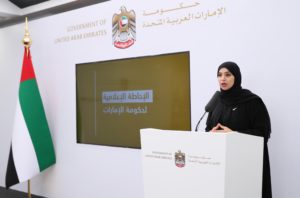Rise In COVID-19 Recoveries To 5,381, 680 New Cases Identified
The UAE Government announced that an additional 577 patients had recovered from COVID-19 after receiving the necessary medical care, raising the total number of recoveries to 5,381.
”The percentage of recoveries has increased since the beginning of May to 28.5 percent of the total cases,” revealed Dr. Amna Al Dahak Al Shamsi, official spokesperson of the UAE Government, during the regular media briefing held today in Abu Dhabi, wherein she provided an update on the latest COVID-19 developments and precautionary measures taken by the UAE to mitigate its impact.
Dr. Al Shamsi said the UAE continues to increase COVID-19 testing across the country, noting that health authorities performed 26,763 additional tests that resulted in the detection of 680 new infections among various nationalities, with the total number of cases amounting to 18,878, including those receiving treatment, recovered cases, and deaths.
She said that today’s tally of infections included four families who did not adhere to precautionary measures and social distancing. These families gathered for Taraweeh prayers in violation of instructions issued by the Emirates Fatwa Council and the General Authority of Islamic Affairs and Endowments, as well as preventative measures issued by health authorities.
By doing so, they spread the virus to other family members who were placed under quarantine, she added.
She announced the death of three individuals of various nationalities, bringing the total number of deaths in the country to 201. Dr. Al Shamsi offered her sincere condolences to the families of the deceased and wished a speedy recovery to all patients.
The number of coronavirus patients currently receiving treatment totals 13,296 individuals of different nationalities, she added.
Dr. Farida Al Hosani, official spokesperson for the health sector, called upon the general public to adhere to preventative measures, warning that some families continued to hold gatherings and distribute food to neighbours, thereby causing the virus to spread.
”We understand that these habits were deeply embedded in UAE culture, but these practices, though done in good faith, could spread the virus to others. Under these exceptional circumstances, we should avoid such habits and instead donate to official bodies for the safety of all,” she added.
Dr. Al Hosani noted that increasing infections worldwide pose a tremendous challenge, requiring everyone “to deal with others as if we are infected. We should adhere to preventative measures as if others were infected. This is possible at all times for the safety and wellbeing of all.” She also noted that the absence of symptoms does not necessarily mean that people are not infected with the virus. They could transmit the disease to others, especially to those suffering from chronic conditions like diabetes and cardiovascular disorders, the elderly, and those with weakened immunity, who are the most vulnerable to complications.
Dr. Al Hosani stressed the importance of adhering to preventative measures when visiting vulnerable individuals by wearing face masks, maintaining a safe distance, and avoiding direct contact.
She advised the public to regularly disinfect surfaces and avoid touching doors, telephones, and light switches, as well as to regularly wash hands with water and soap.
She also stressed the need to adopt healthy nutritional habits, perform regular exercise, get enough sleep to enhance the immune system.
”These preventative measures reduce the possibility of infection and transmission of the virus,” she emphasised.
In light of the resumption of economic activities and the re-opening of public places, she said these measures should not lead to leniency in adhering to preventative measures, though authorities are committed to upholding the public’s safety and security.
Dr. Al Hosani advised children, the elderly, and vulnerable groups to stay home for their own safety and wellbeing.






